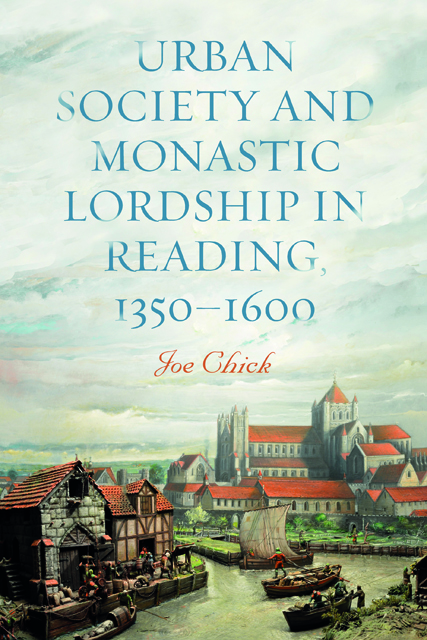Book contents
- Frontmatter
- Dedication
- Contents
- List of Illustrations
- Acknowledgements
- Abbreviations
- Notes on the Text
- Introduction
- 1 Setting and Society
- 2 Political Life
- 3 Economic Life
- 4 Religious Life
- Conclusions and Outlook
- A Social Network Analysis Datasets and Forms of Analysis
- B Trades Categorised by Status
- C Trades Categorised by Sector
- Timeline
- Bibliography
- Index
3 - Economic Life
Published online by Cambridge University Press: 17 December 2022
- Frontmatter
- Dedication
- Contents
- List of Illustrations
- Acknowledgements
- Abbreviations
- Notes on the Text
- Introduction
- 1 Setting and Society
- 2 Political Life
- 3 Economic Life
- 4 Religious Life
- Conclusions and Outlook
- A Social Network Analysis Datasets and Forms of Analysis
- B Trades Categorised by Status
- C Trades Categorised by Sector
- Timeline
- Bibliography
- Index
Summary
The economic life of Reading had a great influence on its political development. The expansion of the town’s cloth industry from c.1470 on the coat-tails of the capital’s economic growth facilitated closer bonds with London society. These supported Reading’s late fifteenth-century political developments. In economic terms, this moment was a more significant watershed than 1539. Local histories of Reading have traditionally described the years following the Dissolution as ones of economic crisis. It was the case that the newly formed corporation suffered financial strain until the mid-1550s, but this did not result from wider economic issues. In fact, it was the continued prosperity of leading clothiers that supported the corporation through this difficult time. The late medieval development of the cloth industry provided Reading with a financial base independent of the abbey that made its merchant guild a viable body of government after the Dissolution.
The chapter begins by looking at the demarcation of economic authority between town and abbey, with the balance lying strongly in favour of the latter. Before examining the macro-economics of the cloth industry, there is an investigation of the social relations that underpinned trading activity. The chapter considers the overlap between these and other forms of social bonds. It then explores the development of the cloth industry in the late fifteenth century and its wider impact, before turning to economic developments after the Dissolution. This final point faces the obstacle of a lack of surviving financial records for much of the sixteenth century. To compensate for this, wills are used as an alternative source of quantitative data, casting a more positive light on post-Dissolution economics than existing histories of Reading.
The Cloth Industry
Cloth came to be the dominant industry in Reading’s economy. Raw wool had long been an important commodity in English trade but, from the later fourteenth century, the production of finished cloth took off. A number of features of post-Black Death society supported this: decreasing wool prices, increasing consumer spending, climate change, and customs duties that allowed English clothiers to buy wool more cheaply than their overseas competitors. In the second half of the fifteenth century, there was a shift in cloth production from large towns to rural areas.
- Type
- Chapter
- Information
- Urban Society and Monastic Lordship in Reading, 1350-1600 , pp. 103 - 136Publisher: Boydell & BrewerPrint publication year: 2022



